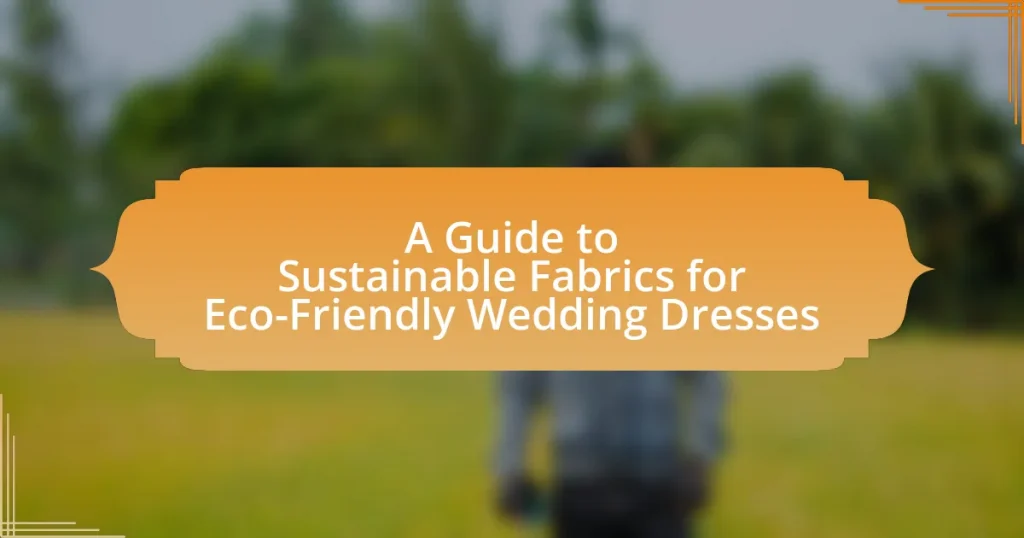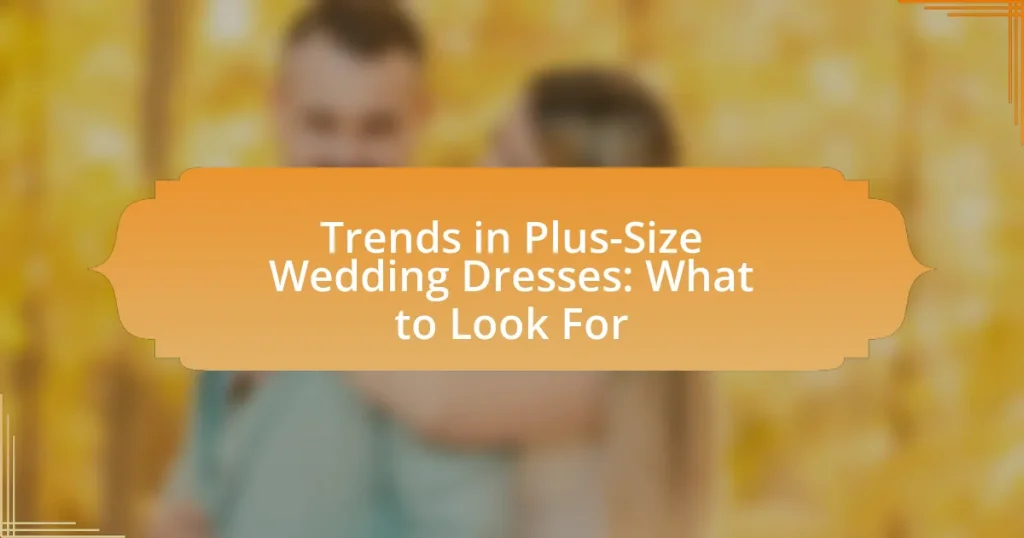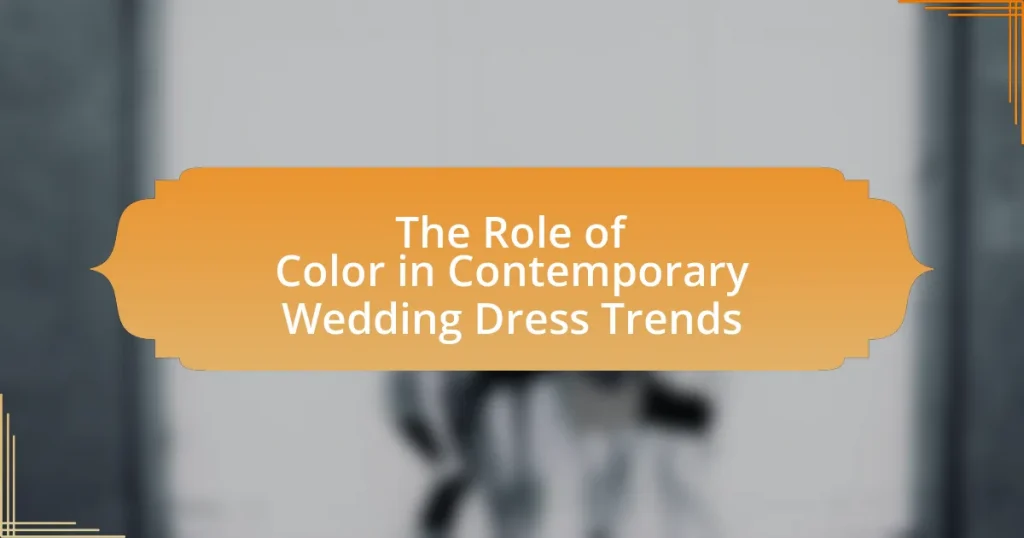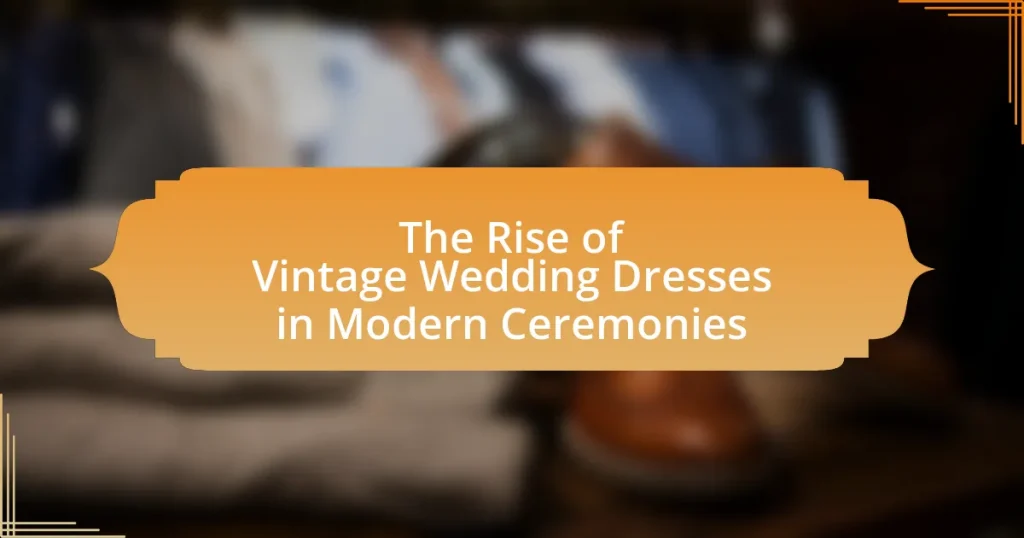The article provides a comprehensive guide to sustainable fabrics suitable for eco-friendly wedding dresses, highlighting materials such as organic cotton, hemp, Tencel, and recycled polyester. It discusses the environmental impacts of traditional fabrics and the benefits of choosing sustainable options, including reduced water usage and support for ethical labor practices. Additionally, the article explores the unique characteristics of these fabrics, their design possibilities, and how they align with various wedding themes. It also offers practical advice for brides on assessing fabric sustainability, caring for their dresses, and balancing style with eco-conscious choices.
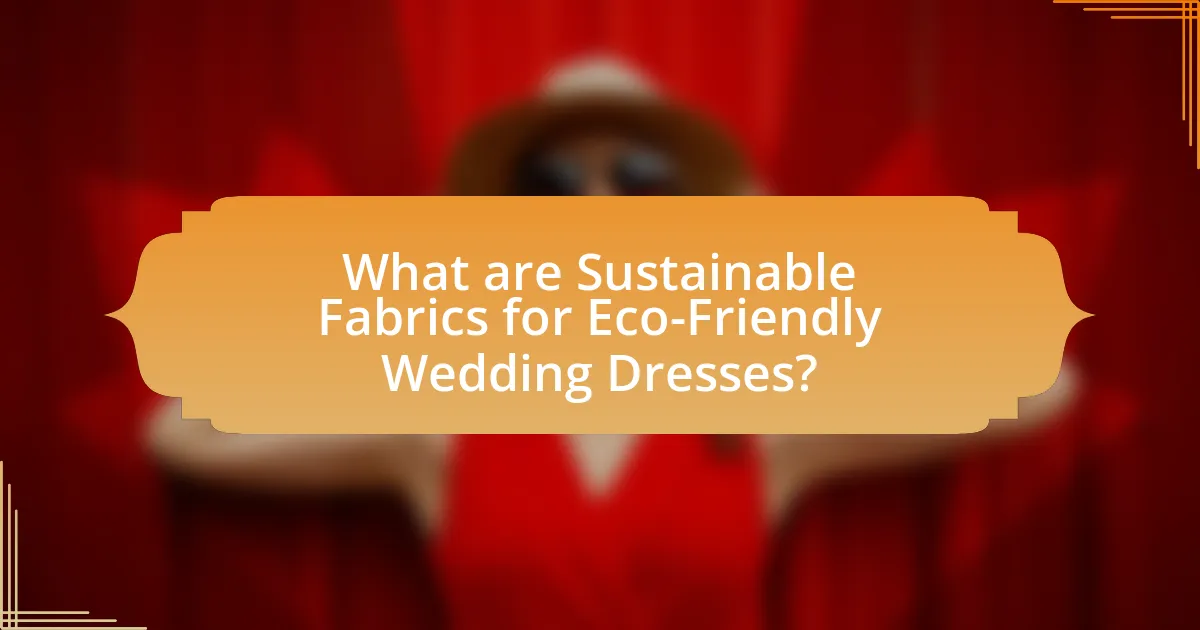
What are Sustainable Fabrics for Eco-Friendly Wedding Dresses?
Sustainable fabrics for eco-friendly wedding dresses include organic cotton, hemp, Tencel, and recycled polyester. Organic cotton is grown without harmful pesticides and chemicals, making it a safer choice for the environment. Hemp is a highly sustainable crop that requires minimal water and no pesticides, while Tencel, made from sustainably sourced wood pulp, is biodegradable and produced in a closed-loop process that recycles water and solvents. Recycled polyester, derived from post-consumer plastic bottles, reduces waste and energy consumption compared to virgin polyester production. These fabrics not only minimize environmental impact but also offer unique textures and styles suitable for wedding attire.
Why choose sustainable fabrics for wedding dresses?
Choosing sustainable fabrics for wedding dresses minimizes environmental impact and promotes ethical practices in the fashion industry. Sustainable fabrics, such as organic cotton, hemp, and Tencel, are produced with reduced water usage and without harmful pesticides, which contributes to healthier ecosystems. Additionally, opting for these materials supports fair labor practices, as many sustainable brands prioritize ethical sourcing and production. According to a report by the Ellen MacArthur Foundation, the fashion industry is responsible for 10% of global carbon emissions, highlighting the importance of making eco-conscious choices like selecting sustainable fabrics for wedding attire.
What environmental impacts do traditional fabrics have?
Traditional fabrics have significant environmental impacts, primarily due to resource-intensive production processes. For instance, cotton cultivation requires substantial water and pesticide use, leading to soil degradation and water scarcity. Additionally, synthetic fabrics, such as polyester, are derived from petroleum, contributing to fossil fuel depletion and greenhouse gas emissions during production. According to the World Wildlife Fund, the fashion industry is responsible for 10% of global carbon emissions, highlighting the detrimental effects of traditional fabric production on climate change. Furthermore, the disposal of these fabrics often results in landfill accumulation, as many are not biodegradable, exacerbating waste management issues.
How do sustainable fabrics contribute to eco-friendliness?
Sustainable fabrics contribute to eco-friendliness by minimizing environmental impact through the use of renewable resources and reducing waste. These fabrics, such as organic cotton, hemp, and Tencel, are produced with methods that require less water, fewer chemicals, and lower energy consumption compared to conventional textiles. For instance, organic cotton uses 91% less water than traditional cotton farming, significantly decreasing water pollution and soil degradation. Additionally, sustainable fabrics often utilize biodegradable materials, which reduce landfill waste and promote a circular economy. This approach not only conserves natural resources but also supports biodiversity by avoiding harmful pesticides and fertilizers.
What types of sustainable fabrics are available for wedding dresses?
Sustainable fabrics available for wedding dresses include organic cotton, hemp, Tencel (lyocell), recycled polyester, and silk from ethical sources. Organic cotton is grown without harmful pesticides, making it environmentally friendly. Hemp is a durable and biodegradable option that requires minimal water and no chemicals. Tencel, produced from sustainably sourced wood pulp, is known for its softness and biodegradability. Recycled polyester, made from post-consumer plastic bottles, reduces waste and energy consumption. Ethical silk comes from farms that prioritize animal welfare and sustainable practices. These fabrics collectively contribute to reducing the environmental impact of wedding attire.
What are the characteristics of organic cotton?
Organic cotton is characterized by its cultivation without synthetic pesticides, fertilizers, or genetically modified organisms (GMOs). This method promotes biodiversity and soil health, resulting in a more sustainable agricultural practice. Additionally, organic cotton is often softer and more breathable than conventional cotton due to the absence of harsh chemicals in its processing. According to the Global Organic Textile Standard (GOTS), organic cotton must meet strict environmental and social criteria, ensuring that it is produced in a way that is both ecologically friendly and socially responsible.
How does Tencel differ from conventional fabrics?
Tencel differs from conventional fabrics primarily in its production process and environmental impact. Tencel is made from sustainably sourced wood pulp, primarily from eucalyptus trees, and utilizes a closed-loop process that recycles water and solvents, resulting in minimal waste. In contrast, conventional fabrics like cotton and polyester often involve extensive water usage, chemical treatments, and non-renewable resources, leading to greater environmental degradation. Tencel also boasts superior moisture-wicking properties and biodegradability, making it a more eco-friendly choice compared to many traditional fabrics.
How can sustainable fabrics enhance the wedding dress design?
Sustainable fabrics can enhance wedding dress design by offering eco-friendly options that combine aesthetics with environmental responsibility. These materials, such as organic cotton, hemp, and Tencel, provide unique textures and drapes that can elevate the overall look of a wedding dress while reducing the ecological footprint. For instance, organic cotton is grown without harmful pesticides, resulting in a softer fabric that is gentle on the skin and the environment. Additionally, Tencel, made from sustainably sourced wood pulp, is known for its luxurious feel and biodegradable properties, making it an attractive choice for modern brides. By incorporating sustainable fabrics, designers can create stunning, innovative wedding dresses that align with the values of eco-conscious consumers, ultimately contributing to a more sustainable fashion industry.
What design possibilities do sustainable fabrics offer?
Sustainable fabrics offer a wide range of design possibilities, including versatility in texture, color, and drape, which can enhance the aesthetic appeal of eco-friendly wedding dresses. Fabrics such as organic cotton, Tencel, and hemp can be dyed using natural methods, allowing for unique color palettes that align with sustainable practices. Additionally, these materials often possess qualities like breathability and comfort, making them suitable for various styles, from flowing gowns to structured silhouettes. The use of sustainable fabrics also supports ethical production methods, which can be a significant design consideration for modern consumers seeking to minimize their environmental impact.
How do sustainable fabrics affect the overall aesthetic of a wedding dress?
Sustainable fabrics enhance the overall aesthetic of a wedding dress by offering unique textures, colors, and draping qualities that traditional materials may lack. Fabrics such as organic cotton, hemp, and Tencel provide a soft, luxurious feel while also allowing for innovative designs that reflect a modern, eco-conscious ethos. For instance, Tencel is known for its smooth surface and ability to drape beautifully, which can elevate the elegance of a gown. Additionally, the use of natural dyes in sustainable fabrics can result in rich, earthy tones that contribute to a distinctive and personalized look. This combination of aesthetic appeal and environmental responsibility resonates with contemporary brides seeking both style and sustainability in their wedding attire.
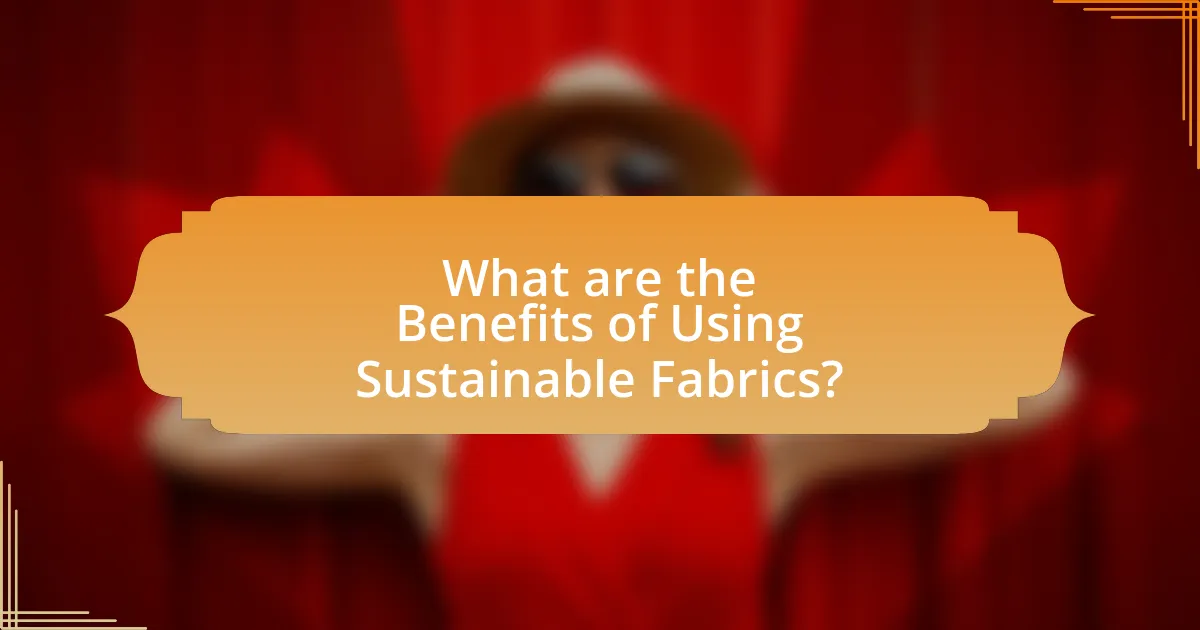
What are the Benefits of Using Sustainable Fabrics?
Sustainable fabrics offer numerous benefits, including reduced environmental impact, improved health for consumers, and support for ethical labor practices. These materials are often made from renewable resources, which minimizes reliance on fossil fuels and decreases carbon emissions. For instance, organic cotton uses 91% less water than conventional cotton, significantly conserving water resources. Additionally, sustainable fabrics are typically free from harmful chemicals, promoting better health for wearers and reducing pollution in waterways. Furthermore, choosing sustainable fabrics supports fair labor practices, as many producers prioritize ethical treatment of workers. This holistic approach not only benefits the environment but also fosters social responsibility within the fashion industry.
How do sustainable fabrics impact the fashion industry?
Sustainable fabrics significantly impact the fashion industry by promoting environmentally friendly practices and reducing waste. The adoption of materials such as organic cotton, Tencel, and recycled polyester leads to lower carbon emissions and less water usage compared to conventional fabrics. For instance, organic cotton uses 91% less water than traditional cotton farming, according to the Textile Exchange. This shift not only addresses environmental concerns but also influences consumer behavior, as more shoppers prefer brands that prioritize sustainability. Consequently, the fashion industry is increasingly integrating sustainable fabrics into their collections, reflecting a broader commitment to ethical production and responsible sourcing.
What role do sustainable fabrics play in reducing waste?
Sustainable fabrics play a crucial role in reducing waste by utilizing eco-friendly materials and production processes that minimize environmental impact. These fabrics often come from renewable resources, such as organic cotton or recycled polyester, which significantly decrease the amount of waste generated during manufacturing. For instance, the use of recycled materials can divert plastic waste from landfills, with studies indicating that recycling one ton of polyester can save approximately 6,000 pounds of carbon dioxide emissions. Additionally, sustainable fabrics are designed for durability, leading to longer product lifespans and reducing the frequency of disposal. This approach not only conserves resources but also promotes a circular economy, where materials are reused and repurposed, further mitigating waste.
How can sustainable fabrics promote ethical labor practices?
Sustainable fabrics promote ethical labor practices by ensuring fair wages and safe working conditions for workers in the textile industry. These fabrics are often sourced from companies that prioritize transparency and social responsibility, which leads to better treatment of laborers. For instance, brands that utilize organic cotton or Tencel typically adhere to certifications like Fair Trade or GOTS (Global Organic Textile Standard), which mandate ethical labor practices. According to a report by the Ethical Fashion Forum, companies that commit to sustainable practices often see improved labor conditions, as they are held accountable for their supply chains. This accountability fosters an environment where workers are treated with dignity and respect, ultimately promoting ethical labor practices in the fashion industry.
What are the personal benefits for brides choosing sustainable fabrics?
Brides choosing sustainable fabrics experience several personal benefits, including enhanced comfort, unique style, and a sense of ethical satisfaction. Sustainable fabrics, such as organic cotton and Tencel, are often softer and more breathable than conventional materials, providing greater comfort during the wedding day. Additionally, these fabrics often feature distinctive textures and colors, allowing brides to express their individuality and stand out. Furthermore, selecting sustainable options contributes to environmental conservation, which can lead to a fulfilling sense of purpose and alignment with personal values, as studies show that consumers who prioritize sustainability report higher levels of satisfaction and well-being.
How do sustainable fabrics affect comfort and wearability?
Sustainable fabrics enhance comfort and wearability by utilizing natural fibers and eco-friendly production processes that prioritize breathability and softness. For instance, organic cotton and Tencel are known for their moisture-wicking properties and gentle feel against the skin, which contribute to overall comfort during wear. Additionally, sustainable fabrics often avoid harmful chemicals, reducing skin irritation and allergies, thus improving wearability. Studies have shown that garments made from these materials can provide better thermal regulation, making them suitable for various climates, which further supports their comfort and practicality in everyday use.
What financial considerations should brides keep in mind?
Brides should keep in mind the overall budget for their wedding, which includes costs for sustainable fabrics, alterations, and accessories. Sustainable fabrics often come at a premium, with prices ranging from 20% to 50% higher than conventional materials due to their eco-friendly production processes. Additionally, brides should consider potential savings from renting or buying second-hand dresses, which can significantly reduce costs while still aligning with sustainable practices. Understanding these financial aspects allows brides to make informed decisions that balance their budget with their commitment to sustainability.
How do sustainable fabrics align with wedding themes?
Sustainable fabrics align with wedding themes by offering eco-friendly options that reflect the values of modern couples who prioritize environmental responsibility. These fabrics, such as organic cotton, hemp, and Tencel, not only reduce the ecological footprint of wedding attire but also complement various wedding aesthetics, from rustic to bohemian. For instance, organic cotton is often used in casual, outdoor weddings, while luxurious Tencel can enhance elegant, formal themes. The use of sustainable materials can also resonate with the growing trend of conscious consumerism, where couples seek to make ethical choices in their celebrations. This alignment is supported by the fact that the global sustainable fashion market is projected to reach $8.25 billion by 2023, indicating a significant shift towards eco-friendly practices in the industry.
What themes are best complemented by eco-friendly wedding dresses?
Eco-friendly wedding dresses are best complemented by themes such as rustic, bohemian, and garden weddings. These themes emphasize natural elements, sustainability, and a connection to the environment, aligning perfectly with the principles of eco-friendly fashion. For instance, rustic weddings often feature organic materials and earthy color palettes, which harmonize with the use of sustainable fabrics like organic cotton or hemp. Bohemian themes celebrate individuality and often incorporate vintage or handmade elements, making eco-friendly dresses a fitting choice. Garden weddings, with their lush greenery and floral aesthetics, also resonate with the eco-conscious approach, as they promote a harmonious relationship with nature.
How can sustainable fabrics enhance a rustic or bohemian wedding style?
Sustainable fabrics enhance a rustic or bohemian wedding style by providing an eco-friendly aesthetic that aligns with the natural, organic elements characteristic of these themes. Fabrics such as organic cotton, linen, and hemp not only offer a soft, textured appearance that complements rustic decor but also reflect a commitment to environmental sustainability, which resonates with the values of many couples today. For instance, organic cotton is grown without harmful pesticides, making it a healthier choice for both the environment and the skin. Additionally, the use of sustainable fabrics can contribute to unique design elements, such as flowing silhouettes and earthy color palettes, which are often favored in bohemian weddings. This combination of aesthetic appeal and ethical sourcing reinforces the overall theme of a rustic or bohemian wedding, creating a cohesive and meaningful celebration.
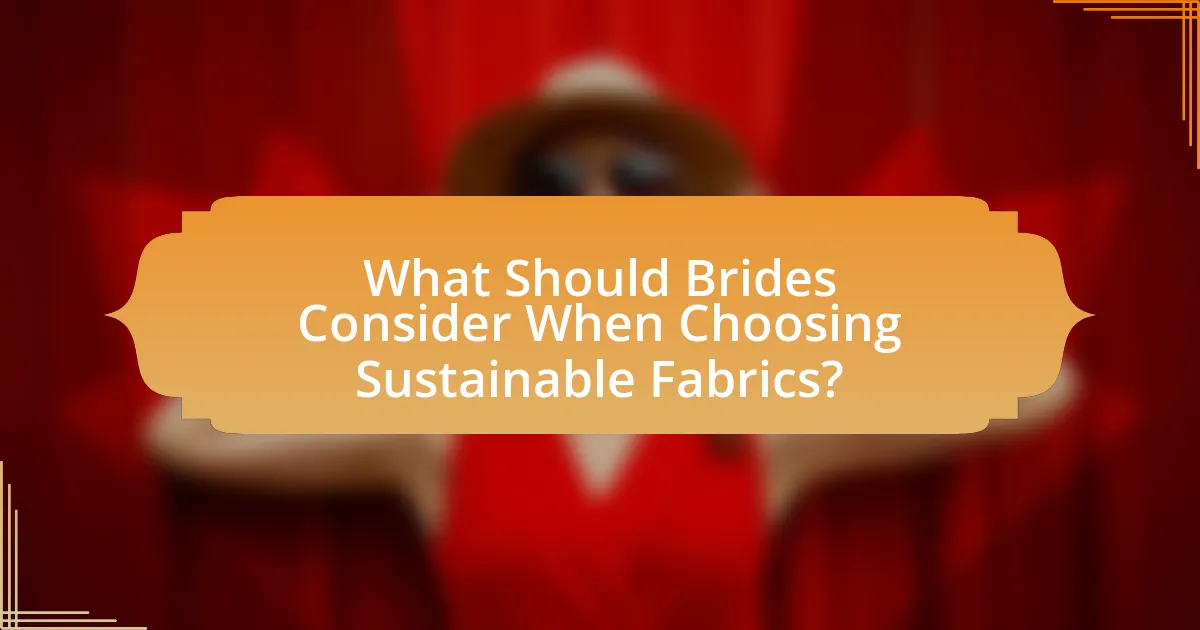
What Should Brides Consider When Choosing Sustainable Fabrics?
Brides should consider the environmental impact, sourcing practices, and lifecycle of sustainable fabrics when making their choice. Sustainable fabrics, such as organic cotton, Tencel, and hemp, are produced with minimal chemicals and water, reducing ecological harm. Additionally, brides should evaluate whether the materials are sourced from ethical suppliers who prioritize fair labor practices. The lifecycle of the fabric is also crucial; biodegradable options can minimize waste after the wedding. According to the Global Fashion Agenda, the fashion industry is responsible for 10% of global carbon emissions, highlighting the importance of selecting eco-friendly materials to mitigate climate change.
How can brides assess the sustainability of fabric options?
Brides can assess the sustainability of fabric options by researching the material’s origin, production processes, and environmental impact. Sustainable fabrics often come from organic or recycled sources, which reduce the use of harmful chemicals and energy consumption. For instance, organic cotton is grown without synthetic pesticides, while recycled polyester repurposes plastic waste, significantly lowering carbon emissions. Additionally, brides should look for certifications such as Global Organic Textile Standard (GOTS) or OEKO-TEX, which verify that fabrics meet specific environmental and social criteria. By evaluating these factors, brides can make informed choices that align with their sustainability values.
What certifications should brides look for in sustainable fabrics?
Brides should look for certifications such as Global Organic Textile Standard (GOTS), OEKO-TEX Standard 100, and Fair Trade Certified when selecting sustainable fabrics. GOTS ensures that textiles are made from organic fibers and adhere to strict environmental and social criteria throughout the production process. OEKO-TEX Standard 100 certifies that fabrics are free from harmful substances, promoting safety for both the wearer and the environment. Fair Trade Certified indicates that the fabric was produced under fair labor conditions, supporting ethical practices in the supply chain. These certifications provide assurance of sustainability and ethical sourcing in fabric choices for eco-friendly wedding dresses.
How can brides research the sourcing of their fabrics?
Brides can research the sourcing of their fabrics by directly contacting fabric suppliers and manufacturers to inquire about their sourcing practices. This approach allows brides to gather specific information regarding the origin of the materials, including whether they are sustainably sourced or ethically produced. Additionally, brides can look for certifications such as Global Organic Textile Standard (GOTS) or OEKO-TEX, which indicate compliance with environmental and social standards. Engaging with online communities and forums focused on sustainable fashion can also provide insights and recommendations on reputable sources.
What are the care and maintenance considerations for sustainable fabrics?
Sustainable fabrics require specific care and maintenance to preserve their integrity and environmental benefits. Washing sustainable fabrics in cold water reduces energy consumption and prevents damage, while air drying minimizes the carbon footprint associated with tumble drying. Additionally, using eco-friendly detergents avoids harmful chemicals that can degrade the fabric and the environment. Regularly checking for stains and treating them promptly with natural solutions helps maintain the fabric’s appearance without harsh chemicals. Finally, storing sustainable fabrics in a cool, dry place prevents mold and deterioration, ensuring longevity and continued sustainability.
How can brides ensure the longevity of their eco-friendly wedding dress?
Brides can ensure the longevity of their eco-friendly wedding dress by properly caring for and storing it after the event. Proper care includes gentle cleaning methods, such as using eco-friendly detergents and avoiding harsh chemicals, which can degrade sustainable fabrics. Additionally, storing the dress in a cool, dry place, ideally in a breathable garment bag, prevents damage from moisture and light exposure. Research indicates that natural fibers, commonly used in eco-friendly dresses, can last longer when maintained correctly, as they are sensitive to environmental factors.
What cleaning methods are best for sustainable fabrics?
The best cleaning methods for sustainable fabrics include gentle hand washing, using cold water, and eco-friendly detergents. Hand washing minimizes wear and tear, while cold water helps preserve the fabric’s integrity and color. Eco-friendly detergents are formulated without harmful chemicals, making them safer for both the environment and the fabric. Studies indicate that these methods significantly reduce the environmental impact compared to conventional cleaning methods, as they lower energy consumption and chemical runoff.
What tips can help brides make informed decisions about sustainable fabrics?
Brides can make informed decisions about sustainable fabrics by researching the environmental impact of materials, prioritizing organic and recycled options, and considering the lifecycle of the fabric. Understanding that organic cotton, linen, and Tencel are produced with fewer chemicals and less water can guide choices towards more eco-friendly options. Additionally, selecting fabrics that are certified by organizations like the Global Organic Textile Standard (GOTS) ensures adherence to sustainability criteria. By evaluating the sourcing and production practices of designers, brides can support brands that align with their values, further promoting sustainability in the fashion industry.
How can brides balance style and sustainability in their wedding dress choice?
Brides can balance style and sustainability in their wedding dress choice by selecting eco-friendly fabrics and supporting ethical designers. Eco-friendly fabrics such as organic cotton, hemp, and Tencel are stylish options that reduce environmental impact due to their sustainable production processes. Additionally, choosing designers who prioritize ethical practices, such as fair labor and minimal waste, ensures that the dress aligns with sustainable values. According to a report by the Ellen MacArthur Foundation, the fashion industry is responsible for 10% of global carbon emissions, highlighting the importance of making conscious choices in wedding attire. By opting for sustainable materials and ethical production, brides can achieve a beautiful and environmentally responsible wedding dress.
What resources are available for brides seeking sustainable wedding dress options?
Brides seeking sustainable wedding dress options can access various resources, including online marketplaces, eco-conscious bridal boutiques, and sustainable fashion blogs. Websites like Etsy and Reformation offer a range of eco-friendly wedding dresses made from sustainable materials. Additionally, bridal boutiques such as The Mews and Lovely Bride specialize in sustainable and ethically produced gowns. Sustainable fashion blogs provide insights and recommendations on designers who prioritize eco-friendly practices, helping brides make informed choices. These resources collectively support brides in finding stylish, sustainable wedding attire.
